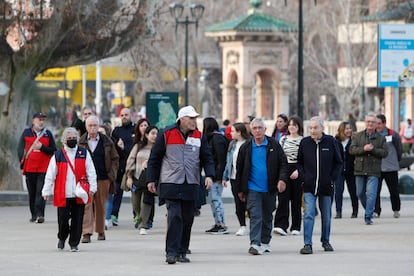Moderate exercise reduces the chances of premature death
Just 75 minutes of mild physical activity a week are enough to prevent one in 10 premature deaths

Many studies defend the medicinal virtues of exercise, detailing how it can improve cardiovascular and mental health and even prevent cancer. Some debate whether intense or moderate exercise is better, but there is a consensus figure: the World Health Organization recommends a goal of 150 minutes of moderate physical activity per week, which can bring significant benefits for everyone. Yet one in four people do not meet that goal – not to mention that 2.5 hours of exercise a week may seem unachievable for someone who has not moved for decades and has a chronic illness.
The results of a study published this week in the British Journal of Sports Medicine may be good news for them. In it, a team led by Soren Brage from the School of Clinical Medicine at the University of Cambridge in the United Kingdom concludes that one in 10 premature deaths could be prevented if people did 75 minutes of moderate physical activity a week – half the usual recommendation. From there, the benefits continue to accumulate, with 16% fewer deaths among those who reach the 150-minute weekly goal.
The authors draw conclusions that have already begun to be seen in previous studies, but they fine-tune the findings by calculating the beneficial effect generated by each dose of exercise, not counting what is done during working hours. In their work, they reviewed 196 studies that included 30 million people, relating the different levels of exercise, mortality and types of disease, from cardiovascular conditions to 14 cancers. Compared with inactive adults, those who reached 150 minutes of activity were 31% less likely to die prematurely from any cause and 29% less likely to die from cardiovascular disease. As for cancer, the advantage was 15%.
The impact of the exercise recommended by the WHO to prevent diseases varies by pathology, reducing the risk of cardiovascular disease by 27% overall and 21% for coronary disease. Regarding cancer, diagnoses in general were reduced by 12%, although the impact was much greater on head and neck cancers, myeloid leukemia or stomach cancer, which were reduced by between 35% and 22% among those who exercised compared to sedentary people, and had a lower incidence of others such as lung, liver or breast: between 16 and 5%.
Gonzalo Grandes, head of the Bizkaia Primary Care Research Unit in Spain and leader of a recent study carried out in 11 Spanish primary care centers to find the minimum amount of exercise necessary to obtain any positive effects, explains that the importance of studies like the recent one is that they show “that the benefits start from the bottom” and that, proportionately, when a person is coming out of inactivity “the benefits are greater in the initial part of those curves.”
In Grandes’ study, published in the British Journal of General Practice, the results of exercise were even more positive: the mortality of those who reached the minimum recommendations of 150 minutes of moderate activity per week was almost 50% lower than that of those who remained inactive. The follow-up period was 15 years. In addition, 20% of the deaths in the group that was observed during the study would have been delayed if all the inactive patients had complied with the recommendations. As in the Cambridge investigation, it was found that small amounts of exercise, even in people who had not moved for decades, had a positive effect: with an increase in moderate activity of 50 minutes per week, there was a 31% reduction in mortality.
Proving that there is no minimum threshold to start reaping the benefits of physical activity is important for people who need to change a habit, something that is always difficult – especially among those who have been inactive all their lives and have limitations due to pathologies, explains Grandes. “If you talk about goals that are hard to achieve, that step will be harder to take, but if they can start with ten minutes of brisk walking a day, the change is more likely to begin,” he concludes.
While the work of the Cambridge team reinforces the idea that any exercise is better than nothing, it also shows that the more minutes of physical activity a person does throughout the week, the greater the health benefits, both to avoid new diseases and to stave off death.
Sign up for our weekly newsletter to get more English-language news coverage from EL PAÍS USA Edition
Tu suscripción se está usando en otro dispositivo
¿Quieres añadir otro usuario a tu suscripción?
Si continúas leyendo en este dispositivo, no se podrá leer en el otro.
FlechaTu suscripción se está usando en otro dispositivo y solo puedes acceder a EL PAÍS desde un dispositivo a la vez.
Si quieres compartir tu cuenta, cambia tu suscripción a la modalidad Premium, así podrás añadir otro usuario. Cada uno accederá con su propia cuenta de email, lo que os permitirá personalizar vuestra experiencia en EL PAÍS.
¿Tienes una suscripción de empresa? Accede aquí para contratar más cuentas.
En el caso de no saber quién está usando tu cuenta, te recomendamos cambiar tu contraseña aquí.
Si decides continuar compartiendo tu cuenta, este mensaje se mostrará en tu dispositivo y en el de la otra persona que está usando tu cuenta de forma indefinida, afectando a tu experiencia de lectura. Puedes consultar aquí los términos y condiciones de la suscripción digital.









































